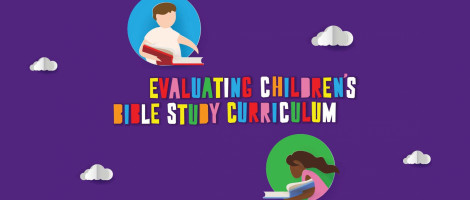On a typical Sunday, the minister is meeting new people coming to the church, checking on Bible Study classes, and ensuring all teachers have supplies needed to teach. But, do ministers know the reason why their teachers are teaching their curriculum? Is the curriculum being taught, best for them or is it what they have taught in the past?
Teachers are actually building and solidifying the spiritual foundation of preschoolers and children at church. Teachers are modeling how to “just make it through” Bible Study—or they are modeling what it means to be a Christ-follower by giving value to the child, by engaging in conversation and making necessary connections to each family.
Why is there a disconnect with a teacher’s preparation of Bible Study and the church’s expectation of class involvement? Teachers might not know how to teach children and they do not understand how the curriculum is designed to be the guide to equip children spiritually. Curriculum is a guide to teaching. It should include the following features:
Bibles
Bible use can begin with babies! Holding the baby and the Bible and allowing the baby to touch and pat the Bible teaches the Bible is real and important. Three-year-olds through sixth graders are learning the Books of the Bible and using Bibles to locate the passages studied. These are essential Bible skills and practices. There should be personal application as related to Bible passages. Applying the passages to personal situations demonstrates the relevance of scripture to life in today’s situations. For teachers, curriculum should include explanations of what the Bible passage means, as well as teaching tips on how to make the passages come alive for children. If you visit a church and the preschool and children’s areas do not have Bibles that are actively being used—run to the next church!
Sound Doctrine
Teachers should know what they believe Biblically and teach toward that. This needs to match what the church believes. Some of our basic beliefs are:
- Our spiritual foundation is knowing God. (Isaiah 40:8)
- God created the world. (Gen. 1:1)
- God created everyone. (Gen. 1:27)
- Jesus is God’s only Son. (John 3:16)
- We desire a personal relationship with God. (John 15:13)
- Jesus is the only way to eternal life. (John 14:6)
If the curriculum being used is not clear on these basic topics, it is time to study and evaluate other publishers.
Authentic Learning
Preschoolers and children recognize when things are not real. At church, everything preschoolers and children participate in should be authentic, trustworthy, and real. Teachers are making connections with the children on how this passage has changed their personal lives and how God is active in their lives this week. The teacher is teaching this in order for the child to know that the passages relates to them today. Just like it pertained to Joseph as he was learning humility and dependence on God while he was sitting in jail, we are learning humility and total dependence on God while we are going through challenging times.
Teachers should not confuse preschoolers by having fantasy story books and fantasy pictures in the rooms at church. (Easter bunny or Santa Claus) For example, books, where animals are talking, should not be in the room. If teachers are teaching absolute truth and we are reading stories that have animals talking, we are creating conflict within the child. Animals do not talk (except Balaam’s donkey, found in Numbers 22:21-39. But that is a children’s story—not a preschooler’s story!)
Variety of Learning Methods
Many churches have preschoolers and children who love to come to church and they are learning through multi-sensory methods. Any typical Bible Study time, children will be drawing, role-playing the Bible passage, singing songs, looking up passages in their Bibles, participating in Bible games, explaining the most important portion of the Bible passage and talking about how this will impact their lives this week. This is much more fun and exciting than just listening to someone talk!
Guided Conversation and Critical Thinking
Teachers are also asking questions which make children think critically. Our children should be encouraged to solve problems. When many are faced with a challenge, they do not know what do we. We are going to equip them to think about solutions for their own lives and how they can rely on God to help them through tough situations. Wise teachers are asking the following questions:
- How can you relate to Joseph (or the main person in the passage)?
- Tell me about 3 important portions of this passage.
- Tell me about 2 Biblical truths that you are going to remember.
- Turn to your neighbor and decide how this passage relates to you.
- What are you going to do in order to depend on God to help you through this situation?
Choosing literature reflects the educational and philosophical beliefs of your church. Through prayer, understanding the needs and characteristics of the learner, and making sure the doctrines of the church are emphasized, literature can be chosen that meets these standards.
For a guide on learning how to evaluate curriculum, download this free pamphlet.
For more information, please contact Dr. Diane Lane, Preschool and Children’s Specialist on the Great Commission Team, at diane.lane@texasbaptists.org or 214.828.5287.
Strengthening a multiplying movement of churches to live out the Great Commandment and Great Commission in Texas and beyond.
The ministry of Texas Baptists is made possible by giving through the Texas Baptists Cooperative Program, Mary Hill Davis Offering® for Texas Missions, Texas Baptists Worldwide and Texas Baptist Missions Foundation. Thank you for your faithful and generous support.
Subscribe to receive stories like this one directly to your inbox.
We are more together.
